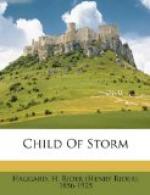“I don’t know whether you hit him; I know he hit you,” I replied, as I shoved him off the rock and ran towards the tilted tree where I had last seen Scowl.
Here I beheld another strange sight. Scowl was still seated in the eagle’s nest that he shared with two nearly fledged young birds, one of which, having been injured, was uttering piteous cries. Nor did it cry in vain, for its parents, which were of that great variety of kite that the Boers call “lammefange”, or lamb-lifters, had just arrived to its assistance, and were giving their new nestling, Scowl, the best doing that man ever received at the beak and claws of feathered kind. Seen through those rushing smoke wreaths, the combat looked perfectly titanic; also it was one of the noisiest to which I ever listened, for I don’t know which shrieked the more loudly, the infuriated eagles or their victim.
Seeing how things stood, I burst into a roar of laughter, and just then Scowl grabbed the leg of the male bird, that was planted in his breast while it removed tufts of his wool with its hooked beak, and leapt boldly from the nest, which had become too hot to hold him. The eagle’s outspread wings broke his fall, for they acted as a parachute; and so did Umbezi, upon whom he chanced to land. Springing from the prostrate shape of the chief, who now had a bruise in front to match that behind, Scowl, covered with pecks and scratches, ran like a lamp-lighter, leaving me to collect my second gun, which he had dropped at the bottom of the tree, but fortunately without injuring it. The Kafirs gave him another name after that encounter, which meant “He-who-fights-birds-and-gets-the-worst-of-it.”
Well, we escaped from the line of the smoke, a dishevelled trio—indeed, Umbezi had nothing left on him except his head ring—and shouted for the others, if perchance they had not been trodden to death in the rush. The first to arrive was Saduko, who looked quite calm and untroubled, but stared at us in astonishment, and asked coolly what we had been doing to get in such a state. I replied in appropriate language, and asked in turn how he had managed to remain so nicely dressed.
He did not answer, but I believe the truth was that he had crept into a large ant-bear’s hole—small blame to him, to be frank. Then the remainder of our party turned up one by one, some of them looking very blown, as though they had run a long way. None were missing, except those who had fired the reeds, and they thought it well to keep clear for a good many hours. I believe that afterwards they regretted not having taken a longer leave of absence; but when they finally did arrive I was in no condition to note what passed between them and their outraged chief.
Being collected, the question arose what we should do. Of course, I wished to return to camp and get out of this ill-omened place as soon as possible. But I had reckoned without the vanity of Umbezi. Umbezi stretched over the edge of a sharp rock, whither he had been hoisted by the nose of a buffalo, and imagining himself to be mortally wounded, was one thing; but Umbezi in a borrowed moocha, although, because of his bruises, he supported his person with one hand in front and with the other behind, knowing his injuries to be purely superficial, was quite another.




